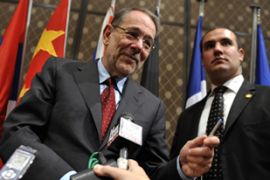Iran agrees to more nuclear checks
Tehran to allow inspections of Qom facility after talks with six world powers.

A second meeting would be held before the end of October, Solana added.
‘Deep evolution’
A French official said Tehran must prove it is changing the way it runs its nuclear programme, and that it must grant access to its second enrichment site within two weeks.
“Time is pressing. There must be proof of a deep evolution in the management of Iran’s nuclear programme,” Jacques Audibert told reporters.
| in depth | |||||||||||||||||||||
|
“For instance it must allow access to the second site, Qom, in the next two weeks.”
Earlier, Saeed Jalili, Iran’s chief nuclear negotiator, held talks with the representatives of the six countries, and said Tehran would never give up its “absolute” rights on its atomic programme, the Iranian ISNA news agency said.
Jalili had comprehensively explained the framework of Iran’s package of proposals regarding its nuclear programme, which took into consideration economic, international security and political issues, ISNA reported.
ISNA said Jalili had also stressed to Britain, France, China, Russia and Germany the need for complete global disarmament, and that he had called for strategies to be put in place to achieve that aim.
The bilateral talks between Iran and the US appeared to be concrete proof of the commitment from Barack Obama, the US president, to engage Iran directly on nuclear and other issues, in contrast to the policies of the previous Bush administration.
Iran-US bilateral talks have been rare since the two nations broke diplomatic relations nearly 30 years ago, in the wake of the Iranian Islamic revolution and the US embassy hostage crisis in Tehran.
US and Iranian negotiators met in Baghdad two years ago to discuss Iraq, but those were three-way talks hosted by Iraq.
‘Complex area’
A US state department spokesman said there would be future meetings between Washington and Tehran if the Iranian government showed willingness to address concerns over its nuclear work.
“That process will take some time,” PJ Crowley said.
“We’re not going to make a snap judgment on Thursday. We’re going to see how that meeting goes, evaluate the willingness of Iran to engage on these issues.”
Iran, which says its nuclear programme is for peaceful purposes, has already defied five UN Security Council resolutions demanding that it suspend all sensitive nuclear activities.
Speaking to Al Jazeera, John Large, an independent nuclear consultant, said: “It’s quite a complex area to actually decipher whether the effort is going into a civilian programme or into a military programme.
“There are the associated industries like the missile delivery systems, the development of missiles, we have seen the launch this week of quite sophisticated missile delivery systems.
“So you’re looking at all the jigsaw pieces coming into place and I’m afraid the conclusion that is coming out of this is that these jigsaw pieces mean that there is a strong weapons programme under way.”
Tehran is under three sets of UN sanctions over its repeated refusal to freeze its uranium enrichment activities, which Western powers fear are aimed at building a nuclear bomb.
